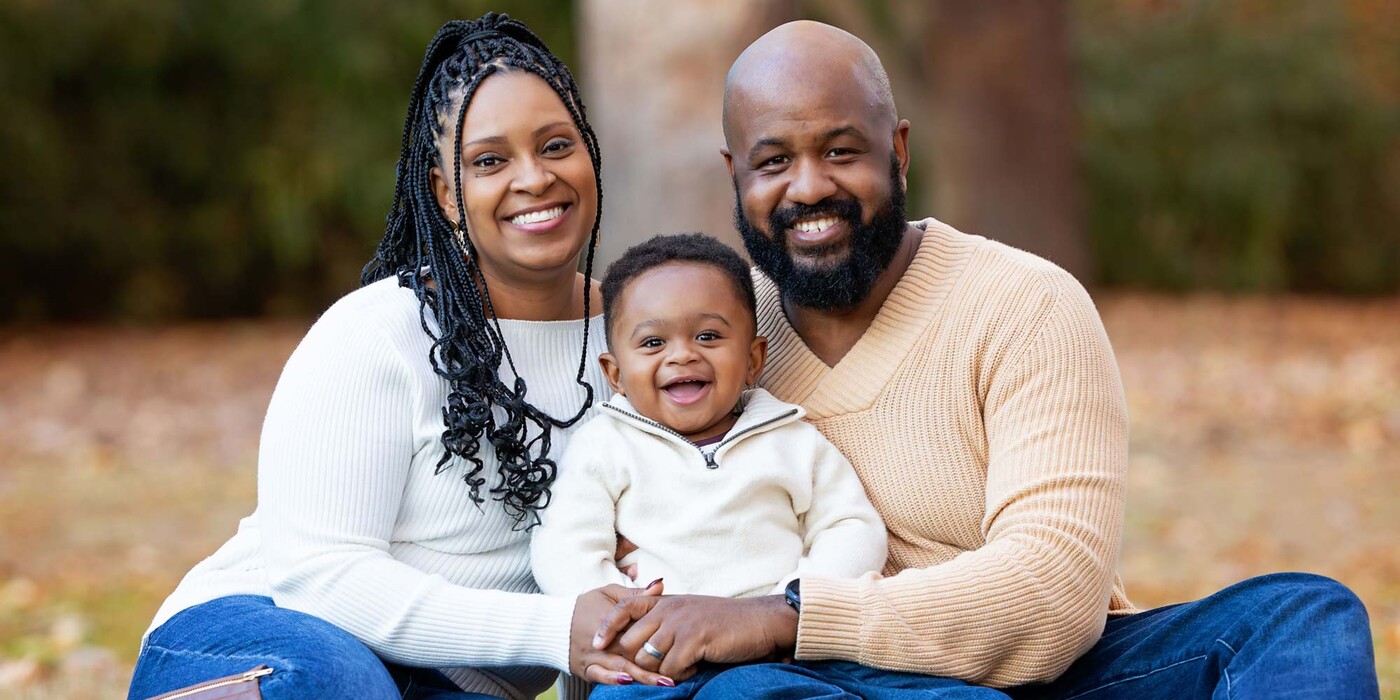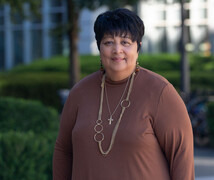Arlene Brown knew she was at high risk for developing breast cancer and was vigilant about getting screened regularly. Still, she wasn’t prepared to find a lump during the 18th week of her first pregnancy. Within days of being diagnosed with triple-negative breast cancer, Brown started a seamless, successful treatment plan at Duke Health, guided by her oncology and obstetrics teams. Two years later, the proud mom of a beautiful toddler has no signs of recurrence. “I’m beyond grateful for the medical team that saved my life,” she said.
Diagnosed with Cancer During Pregnancy
Brown was named after her Aunt Arlene, who died from triple-negative breast cancer, but Brown didn’t undergo genetic testing until after her sister was diagnosed with the same cancer. The testing revealed that Brown had the BRCA-1 gene mutation, which elevated her risk for breast and ovarian cancer. Her doctors suggested she reduce her risk by undergoing a bilateral mastectomy to remove her breasts and an oophorectomy to remove her ovaries. But Brown was 33, and she and her husband wanted to start their family.
Instead, Brown opted for regularly scheduled mammograms and MRIs. The results came back clear, and in December of 2022, the Raleigh philanthropy officer was thrilled to learn she was pregnant. Then, in March, she felt a lump under her right arm during a shower. At first, her doctor said lumps and bumps during pregnancy were common. In May, however, Brown had an ultrasound, then a biopsy. Like her family members, Brown was diagnosed with triple-negative breast cancer.
Undergoing Chemotherapy While Pregnant
After calling local cancer centers for the first available appointment, Brown chose Duke when they responded quickly. “The oncologist sat my husband and me down and laid out the treatment plan with care and understanding,” she said.
Brown was scared about her treatment options, but Duke medical oncologist, Rani Bansal, MD, assured her that pregnant people can tolerate chemotherapy very well and her baby would continue to grow.
“Many people immediately think they have to terminate the pregnancy or wait until they deliver” to be treated, Dr. Bansal said. Instead, the regimen for treating triple-negative breast cancer is modified during pregnancy, and the maternal-fetal medicine team works closely with the patient during her pregnancy to ensure a safe delivery.
“They locked arms around us to make sure we were ok,” said Brown, who was 27 weeks pregnant when she started chemotherapy. “The teams were in lock step.”
That team also included medical therapists, who helped Brown cope with her pregnancy and the postpartum phase, the emotional and mental effects of a cancer diagnosis, the side effects, and the ramifications of her family history. After delivering her baby, physical therapists helped Brown regain her strength, mobility, and function.
Aggressive Treatment After Delivery
Two weeks after her son, Andrew, was born, Brown continued her chemotherapy and started immunotherapy. According to Dr. Bansal, the goal is to destroy all the cancer before surgery to ensure the best prognosis.
At the end of November, Maggie DiNome, MD, a breast surgeon at Duke, performed a bilateral mastectomy to remove Brown’s breast tissue and surrounding lymph nodes. At the same time, Rebecca Knackstedt, MD, a Duke microvascular surgeon, performed Brown’s breast reconstruction. After surgery, Brown completed five weeks of radiation therapy.
“I had gone back and forth on what I wanted to do when they explained the different options,” Brown said. "I wanted a fast recovery to get back to my newborn. Because my surgeons worked together, it all worked in my favor. My new breasts look amazing.”
Healing and Grateful
Two years after her cancer diagnosis, Brown continues to heal. She takes a medication to treat adrenal insufficiency, a side effect that can result from immunotherapy. But more importantly, she has no sign of recurrence.
“Triple-negative breast cancer has a high risk of recurrence, and can come back as stage 4, which is why it is treated so aggressively,” Dr. Bansal said. Brown has done every treatment possible to lower her risk and will be monitored regularly by her doctors for at least five years. “That way, if she has any new symptoms, we can act quickly,” Dr. Bansal said.
When Brown goes to Duke Women’s Cancer Center Raleigh for her follow-up visits, she says the whole experience “seems like a near-distant memory. It happened, and we lived it, and I see the people at the front desk who greet you with kindness. I’m glad to be on the other side, but it’s so nice to see friendly, welcoming faces that care about you. I am healing and I’m grateful.”





